Mina Harrison, American Red Cross volunteer
 Witness To The Holocaust
Witness To The Holocaust

Née Wilhelmina Kuzmenko and born in Philadelphia of naturalized Ukrainian parents, Mina graduated from Quaker
School at 17 in 1944 and signed up with the American Red Cross by stealing and altering her older sister's birth
certificate. "Everybody liked George M. Cohan's music so I adopted his name. Oh Boy! You can take a lie to the ends
of the Earth but you can't come back." Trying to get retirement benefits and a passport decades later would prove
to be a challenge. She served as president of the Valle Mining Company from 1983 until her death from cancer in 1987.
Now as Minna Cohan, she shipped out to England "to serve coffee and donuts to our boys". But when the push came
for the invasion any day, her boss told her, "It's time to go home to Philly". Instead she volunteered
to land on Normandy Beach D-Day+4 (June 10th), getting assigned to duty in a front line field hospital
of "Patton's Army". There she got used to living rough and "getting strafed at night by Gerry".
"...Within days, Lt. Gen. George S. Patton Jr. had turned his Third U.S. Army to the north and was counterattacking against the German flank..."
Six months later, December 16th, 1944, she survived the
Battle Of The
Bulge when 200,000 German troops broke through the Allied lines. British Prime Minister Sir Winston
Churchill stated, "This is undoubtedly the greatest American battle of the war..." From her point of view she
remembered the casualties, estimating "1,200 soldiers died in my arms". Casualty estimates later on each side
reached 75-80,000 according to some. "With the wards so full, my head nurse taught me how to sleep standing
up. The wounded just kept coming in. And I have never been
so cold in my life". While the Allies fought for Freedom, many Germans saw this battle as the last chance at
defending their Homeland, and many Nazis defended their tyrannical
"
Third Reich".
` Perhaps more significant, the teenage girl fresh out of a Philadelphia Quaker School also volunteered
to be captured twice by the Nazis in order to establish where their front lines were located
in the chaos of the inexorable Nazi advance. While both sides had reached "Take No Prisoners" status, she figured
that as a neutral Red Cross worker who treated both enemy and friendly casualties, she had a good chance
of surviving. Captured not once but twice, after the war she was awarded the Medal Of Freedom,
the highest civilian award for this.
As she related, "When a German sergeant grabbed me, I hauled off and hit him across the face as hard
as I could and yelled at him in my schoolgirl German, "You save me for your Commandante!" Thank goodness
my father spoke seven languages and taught us kids. It probably saved my life right there. When I met with their
commander, I tried my poor German again but he surprised me with his perfect English. "You are
lost!" I informed him, but then he tells me, "It is you who are lost, fraulein. We know exactly where we are.
What are you doing out here so far from your lines?" and sends me back on exactly the right road. Brother, that
was a close call."
"Getting back [inside her lines] was no walk in the park either. The Germans had spies impersonating American
soldiers and how could you tell anyone wasn't a spy? I mean a lot of them went to school in America
before being called up for service back in Germany. Our front lines were "Shoot-First-and-Ask-
Questions-Later". When I rolled up in my Jeep, I was held at gunpoint again but by our guys this time."
"But the funny thing was, although the German spies spoke English, they couldn't sing this silly little
song [see below] which I had been taught to sing to get back inside our lines. Anyone who'd ever
been to Jersey could do it easy but not the Nazi spies."
MerseyDotes ["Mares eat oats]
And DoseyDotes ["and does eat oats"]
And little lamsey-divey ["and little lambs eat ivy"],
a kiddley-divey-two wooden ewe ["a kid will eat ivy too. Wouldn't you?"].
"So I sang them the password song and here I am today".

Liberating Death Camps.
One of her final duties: Feed Lifesavers™ to "the Living Dead"
The war is almost over. April 1945. In liberating Nazi Death Camps, the Red Cross found many prisoners too thin ever to be expected
to recover from their starvation. Even though for those prisoners the Nazi regime of The Holocaust had been defeated,
ironically all they could eat was this candy, Lifesavers®.